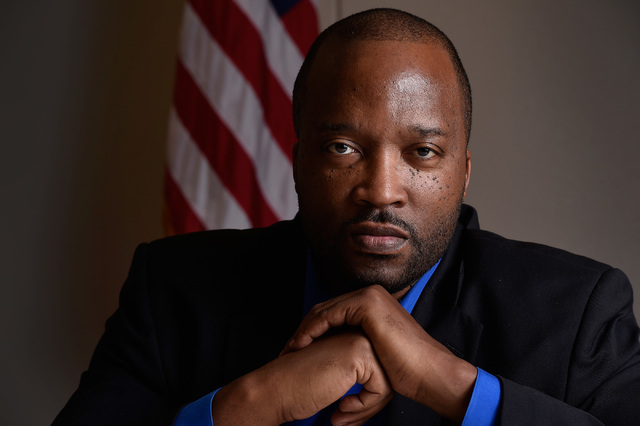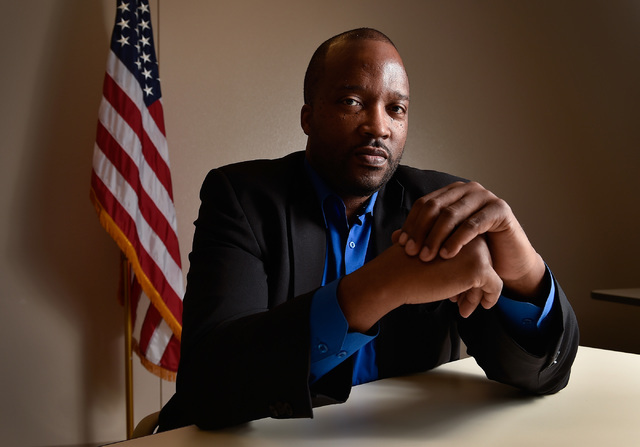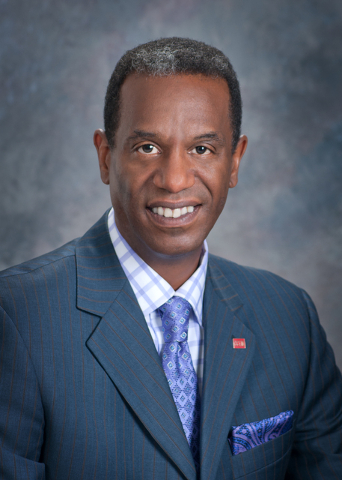Memories still fresh for Las Vegans who watched 9/11 unfold
The terror attacks of Sept. 11, 2001, did more than topple buildings. They altered global dynamics, and they laid the groundwork for war.
They also affected lives, in some cases profoundly. On the 15th anniversary, we look at four people, what they saw, what they remembered and how their lives have changed since 9/11.
A SENSE OF UNITY
You might say Hilarie Grey’s worst day on the job was one of her best.
Grey, the public affairs manager at McCarran International Airport on 9/11 15 years ago, vividly remembers watching the horror at the World Trade Center unfold on television as she prepared to come to work on what would be a 17-hour shift. She even caught the live shot of the second airliner, United Airlines Flight 175, plowing into the south tower just after 6 a.m.
Grey knew she had to get to the airport quickly because she had received word that for the first time in history the nation’s airspace was being shut down and there was bound to be chaos.
Airport director Randall Walker and several McCarran leaders were in Canada, attending an Airport Council International conference. Deputy director Rosemary Vassiliadis — now McCarran’s director — was in charge as dozens of unexpected flights arrived in Las Vegas as federal officials ordered planes grounded immediately after the attack began.
Locally, the airport had become the story and news crews set up for live shots. There was even some concern that Las Vegas-based National Airlines had a flight missing because the flight number was similar to one of the hijacked planes.
Grey conducted hourly media updates as the day progressed — there was no Twitter or Facebook in those days.
Her biggest takeaway from the day was how remarkably the community came together in the crisis.
“People talk about how Las Vegas is not a unified community,” she said. “But on that day, everybody came together. The hotels were communicating with us about taking in people who didn’t expect to be here.
“I had a voice message from someone in the community who called in and said he had a three-bedroom home and would be happy to take in someone who was stranded. My neighbors called and offered to bring me clothes and take care of my dog because they knew that I might not get home for a while.
“The people who were here said, ‘If I had to be stuck somewhere, Las Vegas isn’t too bad of a place to be.’ People were scared and there was so much uncertainty. The media were very gracious to work with.”
Looking back, Grey said air travel would never be the same as a result of 9/11. Passengers can no longer get to their flights if they arrive a half hour before departure because of the security protocols.
The airport itself has changed. Anticipating passengers arriving earlier to catch flights, the retail mix is different with more sit-down restaurants and services like manicurists on both sides of the security barrier.
McCarran’s innovative above-terminal parking structure had to change with new security precautions developed around the 9/11 attack.
And 9/11 changed Grey as well. Years after her career path steered her away from McCarran, she’s back in aviation, recently taking a job as director of corporate communications for Las Vegas-based Allegiant Air.
FIRST DAY ON THE JOB
Gary Banner won’t ever forget his entry to the apartment-complex brokerage business in Las Vegas.
His first day in his new career was Sept. 11, 2001.
After the attacks, business was slow from the get-go, with little activity for six or nine months, said Banner, now a real estate market analyst with Tru Development Co.
People also were afraid to travel. Some 35 million people visited Las Vegas in 2001, down 2.3 percent from 2000 and the first annual drop since the early 1980s, according to Las Vegas Convention and Visitors Authority data.
“People were so nervous for a second attack, it really crimped tourism,” Banner said.
Like other people, he also has mixed feelings about the Transportation Security Administration, which was created two months after 9/11.
Banner described the TSA as a “necessary evil,” saying the country might suffer more terror attacks without the agency, which has often been criticized for its sometimes head-scratching and aggravating passenger-screening protocols at airports.
“It’s a terrible inconvenience, but we’ve got to have it,” he said.
‘DEVASTATING’
Ken Evans would wake up at about 5:45 a.m. everyday to watch the “Today” show as part of his daily routine.
As he was watching the morning of 9/11, he saw the announcement that the first plane had hit.
“I literally stood there in my living room going from disbelief to anger to crying on the phone,” said Evans, president of the Las Vegas Urban Chamber of Commerce.
Evans was concerned about an Air Force academy classmate who was assigned to the Pentagon. The classmate turned out to be OK in the end.
“It was devastating to say the least,” said Evans.
Evans, a 25-year U.S. Air Force veteran, was in the reserves at the time and began receiving more calls to help at a base in Southern California. A few months before, Evans had also just launched a real estate development business.
“My life was kinda crazy for a while,” Evans said of juggling both duties. “It was going be crazy anyway.”
Evans was later deployed to Iraq and Afghanistan in 2008 and 2010.
“I was a sole proprietor trying to start business. On the other hand, I knew I had an obligation,” said Evans.
‘SCRAMBLING’
Leslie Bruno and her team at Pro-Tect Security were managing security for two conventions on 9/11 when word spread about the attacks on the Twin Towers.
“We were scrambling to get information, and then once the information started coming through, we immediately went, ‘OK, we have got to devise a plan,’ ” Bruno said.
Bruno met with key decision makers at the Las Vegas Convention Center, which was hosting the International Baking Industry Exposition, as well as decision-makers at the Sands Expo and Convention Center, which was hosting Pack Expo, an event for those in the packaging industry.
The two venues took completely opposite approaches.
“After the second strike, they (Las Vegas Convention Center leadership) felt it was in the best interest to evacuate their customers and exhibitors. In a matter of a few minutes we had evacuated that entire facility,” Bruno said.
Meanwhile, Sands Expo leadership wanted to stay in place.
“We contacted the audio and visual people and they wheeled out AV carts with televisions on them (so people could watch the news),” Bruno said. “It was actually being broadcast that Las Vegas was next (as a target).”
No one from Las Vegas Sands was available to confirm the account.
Immediately after the attacks, the nation was blanketed in a fog of fear — one that hurt Bruno’s business.
“It was too big for most people to fully comprehend the scope, and a lot of people felt like post-9/11 security businesses would shoot up though the roof, which simply wasn’t the case because people felt like, ‘Well, one security guard isn’t going to fight terrorism.’”
The next year was tough on business as groups canceled and/or postponed events.
Bruno said business started to normalize in 2003.
Reflecting 15 years later, Bruno wonders what happened to the overwhelming sense of pride and unity that brought the country together in tragedy’s aftermath.
“It’s so hard for me to believe we’re still losing so many people and that we’re still in that fight,” she said. “It’s just heartbreaking.”
RELATED
Spontaneous New York-New York 9/11 shrine lives on at UNLV as historical collection
























